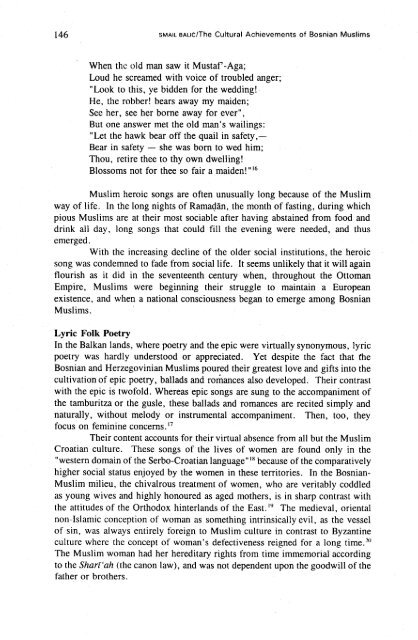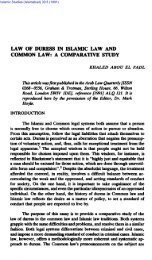You also want an ePaper? Increase the reach of your titles
YUMPU automatically turns print PDFs into web optimized ePapers that Google loves.
146<br />
SMAIL an~iclThe Cultural Achievements of Bosnian Muslims<br />
When thc old man saw it Mustar-Aga;<br />
Loud he screamed with voice of troubled anger;<br />
"Look to this, ye bidden for the wedding!<br />
He, the robber! bears away my maiden;<br />
See her, see her borne away for ever",<br />
But one answer met the old man's wailings:<br />
"Let the hawk bear off the quail in safety,-<br />
Bear in safety - she was born to wed him;<br />
Thou, retire thee to thy own dwelling!<br />
Blossoms not for thee so fair a maiden! "I6<br />
Muslim heroic songs are often unusually long because of the Muslim<br />
way of life. In the long nights of RamadBn, the month of fasting, during which<br />
pious Muslims are at their most sociable after having abstained from food and<br />
drink all day, long songs that could fill the evening were needed, and thus<br />
emerged.<br />
With the increasing decline of the older social institutions, the heroic<br />
song was condemned to fade from social life. It seems unlikely that it will again<br />
flourish as it did in the seventeenth century when, throughout the Ottoman<br />
Empire, Muslims were beginning their struggle to maintain a European<br />
existence, and when a national consciousness began to emerge among Bosnian<br />
Muslims.<br />
Lyric Folk Poetry<br />
In the Balkan lands, where poetry and the epic were virtually synonymous, lyric<br />
poetry was hardly understood or appreciated. Yet despite the fact that the<br />
Bosnian and Herzegovinian Muslims poured their greatest love and gifts into the<br />
cultivation of epic poetry, ballads and romances also developed. Their contrast<br />
with the epic is twofold. Whereas epic songs are sung to the accompaniment of<br />
the tamburitza or the gusle, these ballads and romances are recited simply and<br />
naturally, without melody or instrumental accompaniment. Then, too, they<br />
focus on feminine concerns. l7<br />
Their content accounts for their virtual absence from all but the Muslim<br />
Croatian culture. These songs of the lives of women are found only in the<br />
"western domain of the Serbo-Croatian language" IX because of the comparatively<br />
higher social status enjoyed by the women in these territories. In the Bosnian-<br />
Muslim milieu, the chivalrous treatment of women, who are veritably coddled<br />
as young wives and highly honoured as aged mothers, is in sharp contrast with<br />
the attitudes of the Orthodox hinterlands of the East." The medieval, oriental<br />
non-Islamic conception of woman as something intrinsically evil, as the vessel<br />
of sin, was always entirely foreign to Muslim culture in contrast to Byzantine<br />
culture where the concept of woman's defectiveness reigned for a long time."<br />
The Muslim woman had her hereditary rights from time immemorial according<br />
to the Shari'ah (the canon law), and was not dependent upon the goodwill of the<br />
father or brothers.
















